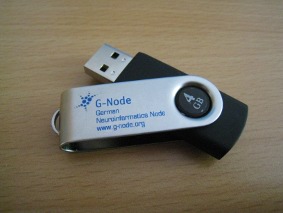The Live System
We are going to provide laptops and bootable USB sticks like this one:

You can plug one of this in one of our laptops and the system will boot automatically from the USB stick. You can of course use the stick even on your personal laptop. By doing this, you can use and test all libraries and tools you used during the courses without messing up with your personal system. Note that you may need to modify the boot device order in the BIOS (press DEL or F2 at boot) or select from a boot device list (e.g. on a Thinkpad this is done by pressing F12 at boot). When the system boots, you can press ENTER or wait 10 seconds to boot the default configuration, which includes a german keyborad layout and a time zone “Europe/Berlin”. If your laptop has a different keyboard layout or you sit in a different time zone, press F1 and follow the instructions on the screen.
The system is based on a Debian GNU/Linux “sid” operating system, all software installed is open source (except for Skype). There is one single user named ”student”: it has no password and it will be logged in automatically. This user can use sudo to execute commands as root. To become root permanently in one terminal just type sux (Super User with X ![]() ). The
). The student's home directory /home/student is located on a 2GB partition on the USB stick and it's permanent, i.e. files stored there are going to be available the next time you boot the system. Everything else on the system is volatile, i.e. everything else you do on the system (like for example installing additional software) is lost after reboot. Note that this way you can mess up with the system as long as you wish, you can even ”rm -rf /”; at next reboot everything will work exactly as it worked before: this is a feature, not a bug ![]() .
.
All software and libraries you will need during the courses have already been installed and configured on the system. If you want to install the same software on your own computer and you are running a Debian-derivative (like for example Ubuntu), you can generate a special debian package which is dependent on all the installed packages by using the command jablicator.
Here a list of tools you may need during the courses:
Editors
- Gedit 2.26.1 (GUI):
gedit - SciTE 1.76 (GUI):
scite - TEA 17.6.1:
teaed - Emacs 21.4 (GUI):
emacs - NEdit 20.08.2004 (GUI):
nedit - xedit (GUI):
xedit - VIM 7.2 (console):
vim - Jed 0.99.18 (console):
jed - nano 2.0.9 (console):
nano
If you are a beginner and/or you don't have a preference already, we suggest to use gedit.
IDE's
- Eric 4.3.1:
eric - IDLE 2.5:
idle - Netbeans 6.7:
netbeans - Eclipse 3.5 + PyDev 1.4.7.2843:
eclipse
Debuggers
- WinPDB 1.4.6 (GUI):
winpdb - DDD 3.3.11 (GUI):
ddd - pdb 2.5 (console):
pdb - GDB 6.8 (console):
gdb - Valgrind 3.4.1 (console):
valgrind
Note that pdb is the standard python debugger and can be used inside any python scripts. Most IDE's feature an internal debugger, so if you use one of them you don't need it.